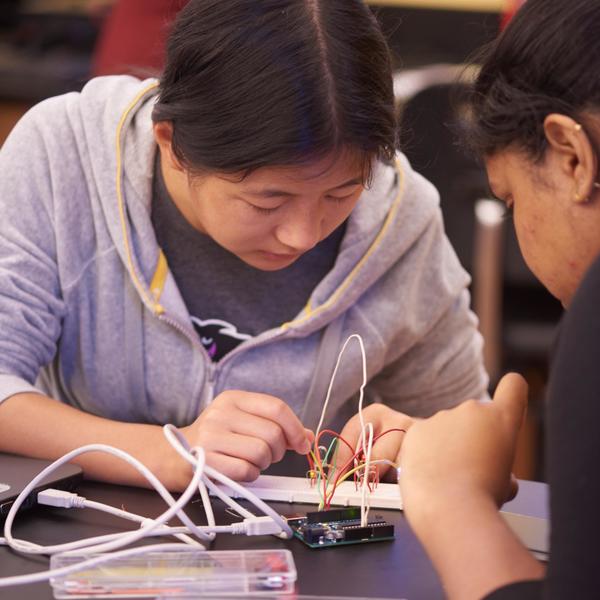This website uses cookies. Find out more in our Privacy Policy.
Use science and technology to develop economical solutions to technical problems. Design, build, and maintain the complex systems and structures of our society.
Combine the value of a liberal arts education with a second undergraduate degree in engineering from the nationally-ranked engineering program at Georgia Tech.
In this program, you'll spend three years at Agnes Scott followed by two at Georgia Tech. Upon completion, you'll receive degrees from both institutions. During these 3 years at Agnes Scott College, students are also preparing themselves for their future career in engineering by completing the required prerequisite courses in small classroom settings that emphasize collaborative learning with professors and peers. After a review of their application and acceptance, students transfer to Georgia Tech for 2+ years.

Dual Degree students attend Agnes Scott College for 3 years. While enrolled at Agnes Scott, they have the opportunity to experience SUMMIT by selecting a major and specialization that aligns with their academic purpose and pursuing global and leadership experiences. Because specific learning outcomes are determined by which major you declare at Agnes Scott, and the engineering curriculum at Georgia Tech, general SUMMIT learning outcomes are listed below. You'll learn:
At Agnes Scott, you will have dedicated guidance through the process of declaring a dual-degree and transferring to your second institution. In your first year at Agnes Scott, you will declare your intent to pursue the dual-degree program with the academic advising office and then you will be assigned to the adviser for the dual-degree engineering program, who will help you shape your curriculum. Students work with their Dual Degree Advisor to reflect upon their engagement in personally meaningful global and/or leadership co-curricular experiences and campus resources (Science Center for Women, Director of Mentored Research, Office of Internship & Career Development) to have an approved resume/CV ready for their first semester at Georgia Tech.
Because of both institutions’ commitment to increase the diversity in the STEM sector, specifically among women and underrepresented populations, this dual degree program is a guaranteed transfer pathway. As long as a dual degree applicant meets the minimum GPA requirements on the Georgia Tech and Emory Grading scales, they are guaranteed acceptance, while all over students must apply as transfers and the accepted applicant profile increases with the competitiveness of the applicant pool. Dual-degree majors will graduate with two types of undergraduate degrees from two high-ranking institutions. Although a Bachelor of Arts and a Bachelor of Science are both perceived equally, a B.A. focuses more on the humanities and arts while a B.S. is more focused in its specific major. This shows a depth and breadth of study accomplished by the graduate, giving them a competitive advantage to pursue advanced study or professional goals.
The majors that students often choose in tandem with this dual-degree program are from departments that actively promote and support research opportunities and study abroad programs, such as Mathematics, Physics, and Chemistry. Once a student spends their 3 years at Agnes Scott, they'll then have more opportunity at their next institution to continue with these valuable experiences in the unique and different ways in which Georgia Tech and Emory University offer them.
Equipped with both the rigorous liberal arts and STEM foundation required by the two degrees, Agnes Scott College Dual Degree graduates bring to their career aspirations in engineering, a lifelong understanding of complex global issues and the ability to lead strategically and honorably.
Competitive dual degree graduates demonstrate their preparedness for success in further study or professional pursuits with a strong liberal arts and science & mathematics foundation. The College of Engineering at the Georgia Institute of Technology provides formal education and research in more than 10 fields of engineering, including aerospace, chemical, civil engineering, electrical engineering, industrial, mechanical, materials engineering, biomedical, and biomolecular engineering, plus polymer, textile, and fiber engineering. It would be nearly impossible to provide a comprehensive list of careers, but here are just a few that can be had with an undergrad degree.